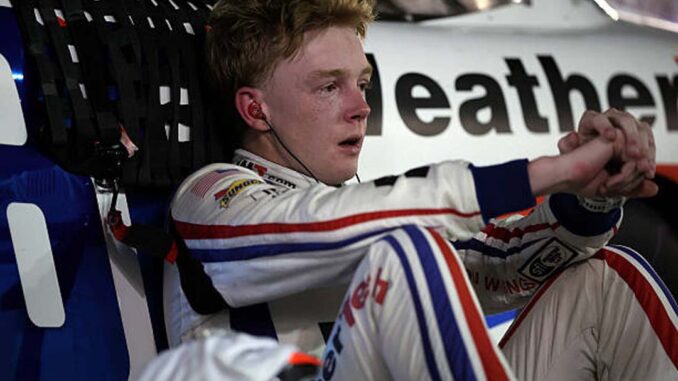
It was a lot to shoulder, and in the end, he went from a confident winner—a phenom—to the 19-year-old kid who just got kicked off the playground.
Connor Zilisch seemed to have it all, until he didn’t. Ten wins, a trophy case already groaning under the weight of his rookie brilliance, and a swagger that said the NASCAR Xfinity Series championship was practically preordained. He showed up at Phoenix ready for a victory parade. Instead, he left looking like someone had stolen his lunch money.
For most of 2025, Zilisch was the guy. Smooth, fast, fearless, and impossibly calm for a teenager who still can’t legally rent a car. But under the desert lights Saturday night, the magic sputtered. His car wasn’t bad—it just wasn’t better. In a race where everything mattered, “good” wasn’t going to be good enough.
“I felt like we were never the best car,” Zilisch said afterward, still trying to process how a season of dominance had slipped through his fingers. “Our pit crew did a really good job. We restarted second, I got the lead both times, but after 20 laps, I just couldn’t hang on. We were the second-best car every run. Whether it was Justin or Jesse, we just never were the best car.”
The “Jesse” he’s talking about, of course, is Jesse Love—his best friend and now the guy who beat him for the championship. The same Jesse Love who used pit-lane perfection to grab the lead and never gave it back.
When the checkered flag waved, Love celebrated like a kid who’d just been told summer break had been extended another month. Zilisch, meanwhile, fought back tears. The confident kid who had spent most of the year looking like he was already halfway to the Cup Series suddenly sounded a lot more human.
“Man, emotion is part of the sport,” he said quietly. “You work so hard for 38 weeks… coming up short sucks.”
He wasn’t wrong.
Zilisch had every reason to hold his head high. Ten wins. The most poles, most top fives, most everything. But in a sport where timing is everything, he peaked one week too soon.
“We dominated until these last three races,” he admitted. “Yeah, it cost us a championship. We’ll keep our heads high. We’re walking home with more than three times as many trophies as anybody else. There’s no reason we should be upset because of this outcome.”
Still, watching your best friend drive off with the hardware? That one stings. “No,” Zilisch said flatly when asked if Love’s win softened the blow. “Good for Jesse. I’m happy for him. Yeah, no.”
For all the heartbreak, there was also maturity—the kind that can’t be taught in simulators or debrief rooms.
“I’ve learned not to clash my personal life and professional life,” he said. “We travel together 38 weeks a year. If you don’t have friends, you’re going to become miserable. It’s tough to balance at times, but Jesse and I have done a good job at that.”
And then, there was the perspective that only comes from losing. “I told my guys when we walked in Thursday, we’re going to give 100 percent,” he said. “No matter what the result is, as long as we know we did our best, we’ll walk out proud—and we did that.”
By the time he left the media center, the sting had dulled just enough for a hint of that old grin to return. “Yeah, I need to lighten up,” he said with a smirk. “It’s not going to light a fire under my ass to win a Cup championship next year. I don’t have a NASCAR championship yet—but I will. Hopefully that’ll be a Cup championship one day.”
Dale Earnhardt Jr. was waiting for him just off pit road. The two hugged—mentor and prodigy, past and future.
“This year’s been a dream,” Zilisch said. “Everyone’s treated me like family. I’ll remember this year forever. I just wish I could have gone out on top and left them with a championship. Yeah, I guess not.”
He’ll get over it. Because champions, including future ones, always do.
- Steve Phelps Is Out As NASCAR Commissioner — And Nobody’s Shocked - January 6, 2026
- Thank You, Dennis Hamlin - December 30, 2025
- JR Motorsports is coming back to the Daytona 500 - November 17, 2025